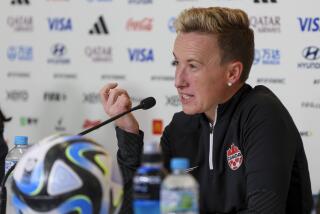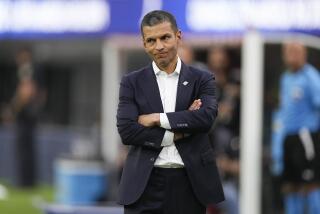No Revolt If Czechs Don’t Win : World Cup: Soccer takes a back seat to political changes in Eastern Europe.
- Share via
MONTECATINI, Italy — Amid the hubbub and hype that accompany daily life in Italy--and indeed much of the world--during the month of World Cup, there is the Czechoslovakian national soccer team.
Here in the tranquil town of Montecatini Terma, where generations of Italians have come to plunge into soothing mineral baths, the Czechoslovakian team has been training for its first plunge into the World Cup in 12 years. On the way, the team has injected sanity and perspective into this wild and hyperbolic sports extravaganza.
Many sports officials from the tournament’s 24 nations have said, in all seriousness, that their teams’ World Cup fortunes are the most important single issue in their countries at the moment. The Czechs are refreshingly different in their approach.
“At the moment, football is of secondary importance,” said Rudolf Bata, the general secretary of the Czech football federation. “The politics and the changes in the country are more important. Sports is a little bit down. People are more interested in these other things than in football.”
Speaking in Prague in March, Bata referred to Czechoslovakia’s nonviolent “velvet revolution” of last November, in which decades of repressive authoritarian rule was swept away. An election is scheduled for next week. Ties with the West have been rejoined.
The Czech delegation never strays far from this theme of rejuvenation, nor are its members allowed to by curious journalists. At an impromptu news conference at the five-star Grand Hotel Wednesday, the subject was repeatedly steered to politics and change, and what it has meant to this team.
Who better to muse on this topic than the Czech coach, Josef Venglos, who holds a doctorate in philosophy.
“The new society that we are building on is only helping the players to make their self-realization, to see a different type of life,” Venglos said. “Players are free, they are looking to the future. Now our players may compete in Europe.”
And, now his players may come home. The Czechs open play against the United States Sunday in Florence, with a team bolstered by the return of two key players who had defected. Midfielder Lubos Kubik and winger Ivo Knoflicek slipped out of a Czech training camp in West Germany in July of 1988 and traveled by car to Belgium. They said they were merely seeking a better life in soccer, not making a political statement.
The world saw their flight in a different light. After two weeks in Belgium, they spent four months in northern Spain, where, according to Kubik, they “did some training, played tennis . . . and waited.”
The players were waiting for their release from their Czech club, Sparta Prague. Kubik, 26, considered the Czechs’ best player, went to England, where he attempted to play for Derby County, then was finally allowed to play in Florence, where he signed a three-year contract. Knoflicek played last season in West Germany.
“Don’t forget, the main reason I (left Czechoslovakia) was for sport,” Kubik said. “But the political and economic situation was very positive in Florence.”
Kubik’s housing certainly was a positive change. He went from a three-room apartment in Prague to a six-room house in Florence. His transportation improved, too. He ditched his tiny Czech Skoda for an Alfa Romeo.
With the political changes in Czechoslovakia came sports changes, too, with mixed blessings. Soccer was at last free of the constraints of the Czech federation, which was temporarily disbanded by the new government. With independence, though, came responsibility.
“Now we have to take care of ourselves from A to Z,” Bata said.
Under the old system, all players were paid the same wage by the federation, although clubs paid performance-based bonuses to some players. With the new system, the clubs will have to pay players’ salaries themselves, forcing club officials to get creative with financing schemes.
Most of the revenue creation will come from an aggressive marketing plan that will bring Western-style corporate sponsorship to the clubs. The country’s largest department store, Kotva, already has moved to sponsor a team.
Bata predicted, somewhat ruefully, that in this scramble for cash, the Czech clubs might sell off their best players to the rich clubs in the Italian, Spanish and German leagues. He worried that this exportation of the country’s best soccer products could harm the national team.
“I’m afraid we’ll kill the sport with the need for money,” he said, echoing sentiments of countrymen who have not been comfortable with a headlong rush to capitalism.
Nevertheless, the prospect of huge salaries has its allure: Six of the 22 players on Czechoslovakia’s World Cup team have signed with West European club teams.
The Czechs have moved sluggishly on the road to the World Cup. Their play in the qualifying rounds and exhibitions in the last few months has been lackluster. The team has been noted for its inability to hold leads and has lost its last four games.
Perhaps Czechoslovakia’s most embarrassing defeat was at home against Egypt on April 4. The team played with little unity and almost no purpose. At one point during the game--disgusted with the play of the Czechs--the home fans began lustily cheering for the Egyptians, who rewarded them by winning, 1-0.
The loss was bad enough, but the game was played during Ramadan, the Muslim holy month of fasting. That meant the Egyptian players fasted every day from sunrise to sunset. The headline in a sports newspaper the day after the match posed the rhetorical question, “Which team was fasting?”
Keeping everything in perspective, Venglos sounded positively uncoachlike in his assessment of his team: “We hope to play well. But this is not as important as the players’ development and well-being.”
At least for now, tranquility reigns for the Czechs.
Times staff writer Randy Harvey contributed to this story.







